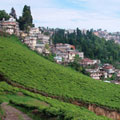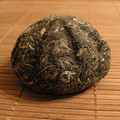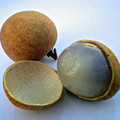Quotes - Cake
„Bĭng: The tea cake itself. Tea cakes or other compressed pu'er can be made up of two or more grades of tea, typically with higher grade leaves on the outside of the cake and lower grades or broken leaves in the center. This is done to improve the appearance of the tea cake and improve its sale. Predicting the grade of tea used on the inside takes some effort and experience in selection. However, the area in and around the dimple of the tea cake can sometimes reveal the quality of the inner leaves.“
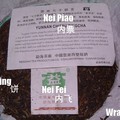
„Nèi piào (内票): A larger description ticket or flyer packaged loose under the wrapper. Both aid in assuring the identity of the cake. It usually indicates factory and brand. As well, many nèi piào contain a summary of the tea factories' history and any additional laudatory statements concerning the tea, from its taste and rarity, to its ability to cure diseases and effect weight loss.“

„Nèi fēi (内飞 or 內飛): A small ticket originally stuck on the tea cake but now usually embedded into the cake during pressing. It is usually used as proof, or a possible sign, to the authenticity of the tea. Some higher end pu'er cakes have more than one nèi fēi embedded in the cake. The ticket usually indicates the tea factory and brand.“

„The most classical Puerh Tea is the Bingcha, recorded in Yong-Zheng 13th year in Qing Dynasty (1735). Each tea cake weighs 7 Liang (357 grams). Seven cakes make 1 Tong (wrapped in leaves), weighing 49 Liang. It was sold in nice places and also was exported abroad. It was re-named as "Yunnan Qizi bingcha - Yunnan seven cake tea" during the Cutural revolution.“
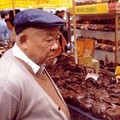
Quotes Tags: Pu-erh, Cake, Tea production, China
„Yunnan Tea Company standardized the trade number for Pu Erh Tea in 1976 for the purpose of export. Each bingcha has 4 digits: the first 2 digits indicate the manufacturing year, the third digit indicates the leaf grade, the last digit indicates the tea factory (e.g. Kun-Ming 1, Meng-Hai 2, Xia-Guan 3, Pu Erh 4). The loose-leaf tea has 5 digits with the third and fourth indicating the class level of raw materials. Examples of early trade numbers for Puerh Tea are 7452, 7562, 7572, 75671, 76563.“
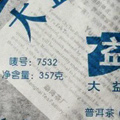
Quotes Tags: Pu-erh, Tea production, Cake, China
„Pu-erh shape - Bing, Beeng, Cake, or Disc - A round, flat, disc or puck-shaped tea, the size ranges from as small as 100g to as large as 5 kg or more, with 357g, 400g, and 500g being the most common. Depending on the pressing method, the edge of the disk can be rounded or perpendicular. It is also commonly known as Qīzí bǐngchá (七子餅茶, literally "seven units cake tea") because seven of the bing are packaged together at a time for sale or transport.“
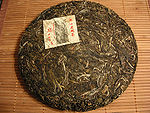
Teas
Bulang Shan 2013 - blind tasting set 4
 1 review
1 reviewrich and delicate bulang bitter taste with sweetish aftertaste, sweet tingling almost in the throat, after...
2014 White2Tea New Amerykah 2
 1 review
1 reviewAn old arbor Menghai blend. Thick body, lingering kuwei [pleasant bitterness], and plenty of oomph. This...
2013 A few Single Trees (maocha)
 1 review
1 reviewThis tea is a blend of a few single tree teas from Bangwei and Bulang. These trees stand out from their...
Theme
Tea by region
We will help you with tea selection.
Do you like quality loose tea?
We will help you to find the right one for you. Be inspired by tea ratings of other tea lovers. Rating stars could help you.


Review your cup of tea.
Review the tea you are drinking and help other tea lovers to find the right cup of tea.



Quotes
„Ku Cha; 苦茶 - Bitter Tea. The tea from a variety of tea tree (Camelia Sinensis Assamica var.Kucha) found in an area around Mensong.“



 Shops
Shops Share on Facebook
Share on Facebook






